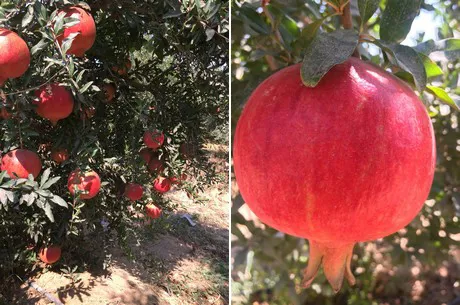For the first time, Egyptian growers must be certified before they can export their pomegranates. After an early start to the harvest season, the effects of the mandatory certification can now be felt. And according to May Salem of FinBi, those effects are really positive.
As the pomegranate season was about to start, the cultivation of the fruit would really change, thanks to a government decision to only allow certified farms to have their produce exported to other countries: “This certification changed a lot, as we had to change our approach to cultivating pomegranates. Due to the new rules, which aims to heavily prevent the use of pesticides, it means that once a disease starts spreading on the produce, you can’t tackle it with pesticides like we would before. The rules are very strict.” May Salem of FinBi for Land Reclamation and Agriculture Development explains.

The Egyptian season has been very good thus far, with a very early start: “The season started as early as the beginning of September, which is unusual, it resulted in us finishing the total harvest of our pomegranates already. Our farms got their certifications by the 2nd of September, which made us one of the first certified exporters, and enabled us to be an example for the rest of Egypt. Multiple growers, exporters and importers from other countries came to visit us, to see how much this certificate changed the way we grow pomegranates.”
The produce is tested after harvesting to see if it qualifies for export. There is a committee with three members consisting of the organizations CAPQ, AEC and HEIA. They check if farmers are upholding the new rules: “Of our 800 tonnes of pomegranates, about 575 tonnes were tested good enough for certification and thus for export. This is a very large quantity that will really help us get the pomegranate in the international market. The pomegranates were tested to contain only a single product of pesticides, with only 20% of the allowed maximum for EU regulations being reached. This means we’re doing great!”

Salem hopes the certificate will improve the image of Egypt on the international market: “Egypt’s image has not been very good over the past years. We see a growing demand for the pomegranates now that Egypt can basically guarantee the quality, thanks to the certificates. The fact that unusual markets like Asia and Africa are becoming more familiar with the product, means our image will hopefully improve. Egypt should honestly start branding their produce, in the same way that our biggest pomegranate competitor, Turkey, does.”
The prices of Egyptian pomegranates have doubled since the new regulations were put in place. There is a higher local and international demand, the quality is now guaranteed and according to Salem this means the jump in prices can be justified. “With Turkey being such a strong competitor, Egypt needed to do something about the quality. That problem has been solved, we get better prices for our produce and Turkey’s pomegranate prices are even higher than ours. Egyptian pomegranates are now a very solid alternative though. And locally the fruit is gaining ground as well thanks to a price that is still cheaper than oranges, or Lebanese grapes in the local markets.”
For more information:
May Salem
FinBi for Land Reclamation and Agriculture Development
Tel: +202 37495616
Email: may@natesngrapes.com
www.natesngrapes.com
